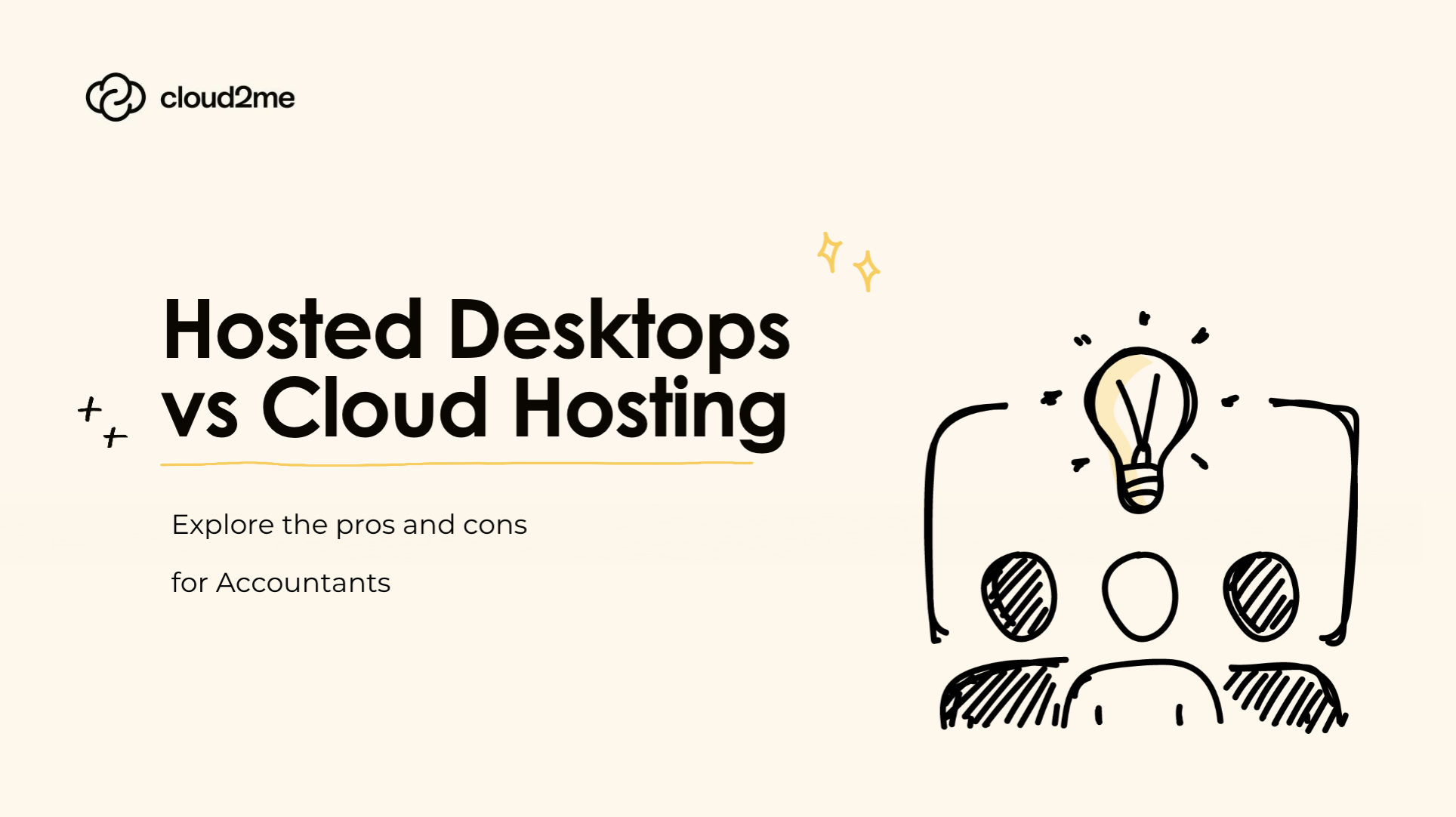Most accountancy firms today find themselves fighting two IT worlds – the flexibility of cloud-based apps like Xero, QuickBooks and Microsoft 365, and the familiarity of desktop software such as IRIS, CCH, Digita or TaxCalc.
This hybrid reality raises an important question… if cloud hosting is the future, what role do hosted desktops still play?
In this blog, we’ll explore the pros and cons of each approach, highlight the risks accountants face with cloud hosting alone, and show where a hosted desktop service can provide the extra layer of security and resilience firms need. Keep reading.
Key Takeaways for Accountants
- Cloud hosting isn’t risk-free: OneDrive and SharePoint are powerful but can expose firms to security gaps if not tightly managed.
- Most firms are hybrid already: surveys show a mix of cloud, desktop apps, and even on-prem servers is still the norm.
- Hosted desktops offer control: centralised security, UK data residency, and smoother support for desktop accountancy software.
- Cloud + hosted desktop = balance: the safest approach is often using cloud apps for collaboration, with a hosted desktop as the secure backbone for sensitive data and desktop tools.
The security gap accountants can’t ignore
Cloud services like OneDrive and SharePoint are brilliant for collaboration, but they can leave gaps that many firms underestimate.
Common risk traps include:
- Over-sharing: “Anyone with the link” file sharing still being used
- Guest sprawl: Dozens of external users granted long-term access
- Unmanaged devices: Files synced to personal laptops or phones outside firm control
- Offboarding gaps: Leavers retaining access to client files via personal accounts
These aren’t hypothetical risks. The US Cybersecurity & Infrastructure Security Agency (CISA) explicitly warns that broad external sharing in Microsoft 365 increases the chance of unauthorised access and should be locked down as standard.
For accountants, where a single exposed spreadsheet could mean a data breach, these risks aren’t worth ignoring.
What firms are really doing today
Cloud2Me’s own surveys across the accountancy sector show just how mixed the landscape really is:
- Over a third of firms still run a blend of cloud and legacy systems
- 1 in 5 keep a physical server in the office
- 58% rely on a generalist IT provider, while nearly a third leave IT to a partner or director
- Only 7% currently use an accountancy-specialist hosted desktop
These findings make one thing very clear… few firms are 100% cloud, and most are already living in a hybrid model.
Hosted desktops: why they still matter
A hosted desktop offers accountants a single, secure workspace where data, applications and users are centrally managed. Key benefits include:
- Security first: Confidential files stored in a UK-based environment with server-side controls, hourly backups and easy offboarding
- Purpose-built: IRIS, CCH, Digita, Sage, TaxCalc, Virtual Cabinet and more run smoothly without compatibility issues
- Resilience: Updates and patches handled centrally, ensuring consistency across the practice
- Future-proofing: Allows firms to adopt cloud apps at their own pace, without a risky “all-or-nothing” switch
For many practices, this balance (using cloud apps where they shine and hosted desktops for mission-critical data and applications) is the safest route forward.
Hosted Desktops vs. Cloud Hosting at a Glance
Sometimes the easiest way to decide is to see the differences side by side.
| Consideration | Cloud Hosting (OneDrive, Sharepoint, etc.) | Hosted desktop (specialist provider) |
| Security | Strong controls available, but only if configured correctly. Risk of over-sharing, unmanaged devices, and leaver access. | Centralised, ring-fenced environment with hourly backups, server-side security, and simple account offboarding. |
| Data residency | Typically global; UK data storage is not always guaranteed. | UK-based Tier 3 data centres with local ownership and compliance focus. |
| Optimised for server-based accountancy apps | Great for cloud-native apps (Xero, QuickBooks, Office 365). Traditional desktop software still needs a server | Optimised for accountancy apps like IRIS, CCH, Digita, Sage, TaxCalc, Virtual Cabinet, with all the benefits of cloud. |
| Collaboration | Excellent for real-time teamwork and document sharing. | Supports secure file access and sharing, but often paired with cloud apps for day-to-day collaboration. |
| Support | General IT providers may lack accountancy expertise. | Specialist support team who understand accounting workflows and software quirks. |
| Scalability | Easy to add users, but storage/performance limits can vary. | Autoscaling desktops and storage, tuned for busy season peaks. |
| Future-proofing | Encourages full migration to cloud apps, sometimes before firms are ready. | Allows firms to adopt cloud at their own pace, without disrupting existing systems. |
When pure cloud hosting can be enough
That’s not to say cloud hosting doesn’t work on its own. For smaller, cloud-native firms running Xero or QuickBooks, with tight device management and well-configured Microsoft 365 policies, the cloud can be sufficient.
But for firms with:
- Legacy desktop applications
- Limited in-house IT support
- Partners or directors juggling IT decisions
- Or simply a desire for greater security assurances
…a hosted desktop provides a stronger safety net.
The bottom line for accountants
This isn’t about choosing cloud or hosted desktop. It’s about choosing the right mix for your firm’s size, setup and risk appetite.
Cloud hosting delivers collaboration. Hosted desktops deliver resilience. Together, they allow accountants to modernise without compromise.
Cloud2Me already supports hundreds of UK accountancy practices with secure, specialist hosted desktop services. If you’d like to see how this model could work alongside your existing cloud tools, book a quick consultation with our team

